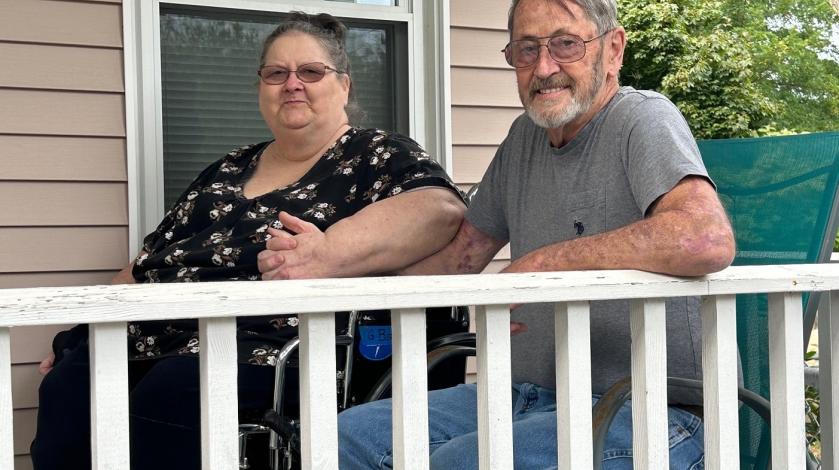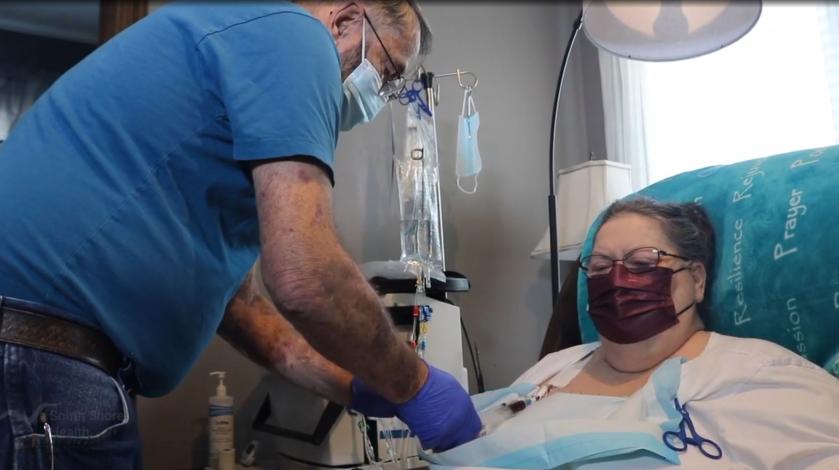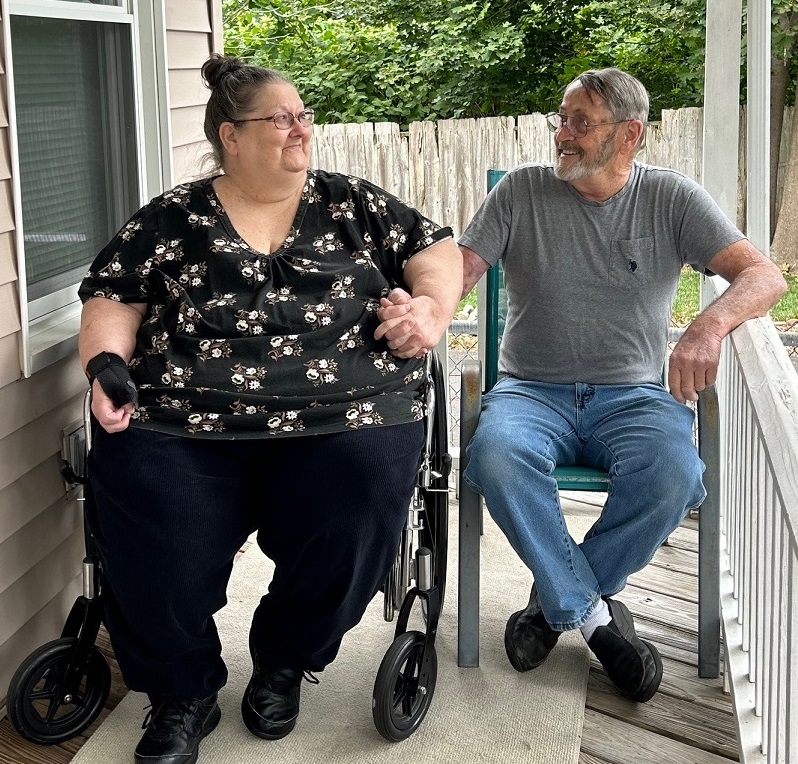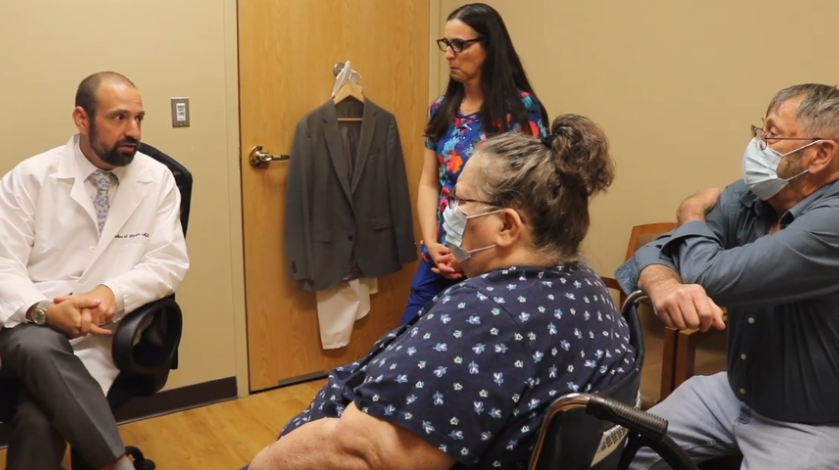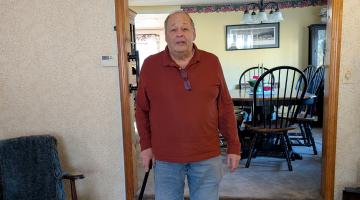Gigi’s Choice: ‘Home Dialysis Saved My Life’
Author

South Shore Health
Georgeanne Barnes had a decision to make.
When she arrived at South Shore Hospital last December, Gigi, as she likes to be called, was very sick.
Shortness of breath brought her to the Emergency Department, but according to nephrologist Joshua Hundert, MD, that was just one symptom of her declining health due to diabetes and the progression of her chronic kidney disease.
“When I saw Gigi in the hospital, I quickly determined she needed dialysis,” Hundert said.
Her kidneys were on their last bits of function and the diuretics given to remove fluid and ease her breathing didn’t work, he said.
As next steps for her care, Hundert presented Gigi two options: go to a nursing facility to receive dialysis or go home, don’t do dialysis and focus on comfort – in other words, hospice care.
Difficult decisions and then a third option – home dialysis
“The two options were dialysis or dying,” recalled Gigi, noting she appreciated Dr. Hundert’s directness. “Too many people dance around the issues,” she said.
But the decision was difficult for Gigi, a retired nurse, who said for many years she considered dialysis a death sentence.
“I didn’t want to do dialysis at first,” she said. “I didn’t want to put my family through that turmoil.”
She also didn’t want to leave them.
“I thought of my granddaughters, who have never experienced death or even been to a funeral, and my husband who couldn’t live without me.”
As Gigi and Bill weighed their options, a third choice came to Hundert.
“I thought what if Gigi did dialysis at home? Could we make her better and could we even do that?”
Fresenius Medical Care, which provides kidney dialysis at South Shore Hospital and thousands of outpatient dialysis centers, also offers home hemodialysis for patients with the use of the innovative NxStage system.
Hundert, who is also Medical Director for Fresenius Kidney Care in Quincy pitched the plan with the home program therapies manager and then floated it with Gigi and Bill, who enthusiastically jumped at the chance to do her dialysis treatments at home.
WATCH THE VIDEO: The Benefits of Home Hemodialysis
Bill gets schooled in home dialysis
By the end of December nurses from Fresenius had begun training Bill on the NxStage dialysis machine and Pure Flow system, which provides kidney function for Gigi.
Cleaning the blood, known as clearance and removing fluid, which is called ultra-filtration are the two functions of dialysis, Hundert explained. “In Gigi’s case, she needed both.”
While he never had medical training or had to “glove up” for anything before, Bill stepped in to his care partner and dialysis technician roles like a hero, Gigi said.
“We’ve been married for 50 years,” said Bill. “I didn’t want to lose her.”
Fresenius clinic nurses provided six weeks of training, which included a computer course, instructional videos and other “homework” for Bill, who took to it very quickly, Gigi said.
“The nurses brought these immense binders with everything you need to know about setting up and operating the NxStage system. It was a masterclass on dialysis,” she said. “We felt educated and supported throughout the training and even today.”
If they have any questions or issues with the dialysis equipment during a treatment, Bill can pick up the phone and speak to a nurse who coaches him through the problem and will stay on the call until it is resolved, Gigi said.
“We are never without support, even on nights and weekends,” she said.
Best of all, is being able to do her treatments in the comfort of home and on our time, Bill added.
Home dialysis has been lifesaving and life changing
Gigi has four, 4-hour dialysis treatments at home each week – one more than she would be able to have in a dialysis center, which is beneficial, Hundert said.
“More dialysis is always better because it’s closer to your natural kidney function.”
The improvement in Gigi’s health since starting home dialysis has been remarkable.
Hundert said her treatments have removed 80-100 pounds of fluid, which has made a tremendous difference in Gigi’s quality of life and functional mobility.
Before dialysis, lymphedema caused Gigi’s legs to swell with fluid making it difficult for her to stand and nearly impossible to walk.
“I had lost my mobility,” she said. ”I couldn’t even get out of the house to go to a doctor’s visit.”
Losing the weight and doing physical therapy has allowed Gigi to use a bariatric walker to get around the house and get in and out of the car for all of her healthcare appointments.
Gigi’s blood pressure is now under control, her shortness of breath is greatly improved and her blood work results are better than they had been for years.
And the positive changes haven’t only been physical.
“I’m in a much better place now mentally and emotionally,” said Gigi.
But she remembers reaching “rock bottom” nine months ago.
“Life was miserable. I was sick, but I didn’t know how sick,” she recalled. “We couldn’t go anywhere. We wanted to visit our family on the Cape, but I couldn’t walk anymore. I was so distraught, I thought of ways to kill myself.”
Then Dr. Hundert walked into Gigi’s hospital room and changed both the narrative and her life with two words – home hemodialysis.
“Now I have hope,” she said. “I can see the progress I’ve made and I want to work harder and keep the ball rolling. That’s what home dialysis has done for me.”
For the first time in a long time, Bill said he is optimistic about their future together.
“Thanks to dialysis, there has been a great big improvement,” Bill said. “Gigi’s mobility is getting better. Now we can go sit on the porch together or go for a ride in the car. We can get our lives back.”
Lessons learned: Anyone is a candidate for home dialysis
Gigi’s progress has also been an inspiration to Hundert, who had never before recommended home dialysis for a patient with her needs, but now does so regularly, based on her success.
“I’m floored by how well she has done. I could not have imagined being where we are today, nine months after we started this, and I hope that Gigi can continue to do this for months and years to come.”
Hundert said he underestimated Gigi and Bill and their commitment to her care and dedication to each other.
“I’m proud of her and also amazed by her, the staff at Fresenius and the NxStage equipment,” he said. “What was proved is this machine could do it with the right patient.”
While home hemodialysis has been around for many years, Hundert said providers have been hung up on recommending it only for the “perfect patient.”
“We wanted someone who was 100% compliant, had a working fistula in their arm, somebody who was going to be no problems,” he said.
“What Gigi has shown us is there is no perfect candidate – anyone is a candidate for home dialysis.”
Because her kidneys have failed, Gigi will be on dialysis for the rest of her life, Hundert said.
“Dialysis is a part of Gigi’s future and it’s part of Bill’s future too, because he is her caretaker and she can’t do this without him. But again, as Gigi has shown us, lots of people live a really good quality of life on dialysis, and particularly when they are doing dialysis at home.”
Hundert said Gigi and Bill’s story has been a good lesson for him as a physician and a clinician.
“Sometimes you have to trust your patients to know what’s best for them,” he said. “As a home dialysis practitioner, I am amazed every day by what my patients do to stay alive, get healthier and get better.”
Joshua Hundert, MD, is Chief of Nephrology at South Shore Hospital, Medical Director for Fresenius Kidney Care in Quincy and is in private practice with Commonwealth Nephrology Associates, which provides nephrology care at South Shore Medical Center.
Author

South Shore Health

